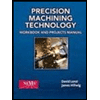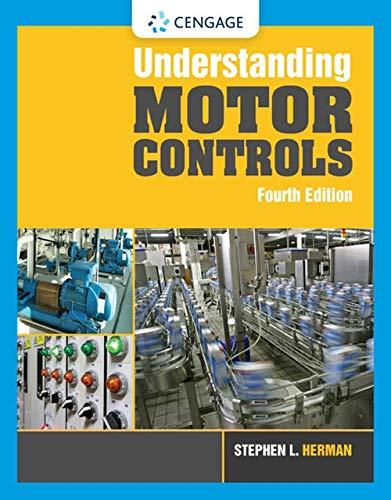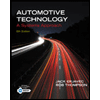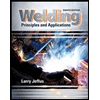
Student Workbook and Project Manual for Hoffman/Hopewell's Precision Machining Technology
3rd Edition
ISBN: 9798214105710
Author: Peter J. Hoffman and Eric S. Hopewell
Publisher: Cengage Learning US
expand_more
expand_more
format_list_bulleted
Textbook Question
Chapter 2.5, Problem 6RQ
What does SPC stand for?
Expert Solution & Answer
Trending nowThis is a popular solution!

Students have asked these similar questions
Consider the feedback controlled blending system shown below, which is designed to keep theoutlet concentration constant despite potential variations in the stream 1 composition. The density of all streamsis 920 kg/m3. At the nominal steady state, the flow rates of streams 1 and 2 are 950 and 425 kg/min,respectively, the liquid level in the tank is 1.3 m, the incoming mass fractions are x1 = 0.27, x2 = 0.54. Noticethe overflow line, indicating that the liquid level remains constant (i.e. any change in total inlet flow ratetranslates immediately to the same change in the outlet flow rate). You may assume the stream 1 flowrate andthe stream 2 composition are both constant. Use minutes as the time unit throughout this problem.
Identify any controlled variable(s) (CVs), manipulated variable(s) (MVs),and disturbance variable(s) (DVs) in this problem. For each, explain how you know that’show it is classified.CVs: ___________, MVs: _____________, DVs: ______________
b) Draw a block diagram…
A heat transfer experiment is conducted on two identical spheres which are initially at the same
temperature. The spheres are cooled by placing them in a channel. The fluid velocity in the channel is
non-uniform, having a profile as shown. Which sphere cools off more rapidly? Explain.
V
1
My ID# 016948724
last 2 ID# 24
Last 3 ID# 724
Please help to find the correct answer for this problem using my ID# first write le line of action and then help me to find the forces {fx= , fy= mz= and for the last find the moment of inertial about the show x and y axes please show how to solve step by step
Chapter 2 Solutions
Student Workbook and Project Manual for Hoffman/Hopewell's Precision Machining Technology
Ch. 2.1 - Briefly describe what you believe are the two most...Ch. 2.1 - Briefly describe what you believe are the two most...Ch. 2.1 - What should be done in the case of a personal...Ch. 2.1 - What does OSHA stand for and what is OSHA's...Ch. 2.1 - List three specific clothing items that should not...Ch. 2.1 - If someone working around machinery has long hair,...Ch. 2.1 - Never operate machinery without proper ______ in...Ch. 2.1 - What is PPE?Ch. 2.1 - What is the most common and important piece of PPE...Ch. 2.1 - What does HCS stand for?
Ch. 2.1 - What does GHS stand for?Ch. 2.1 - What is a pictogram?Ch. 2.1 - What does NFPA stand for?Ch. 2.1 - What does HMIS stand for?Ch. 2.1 - Prob. 15RQCh. 2.1 - Prob. 16RQCh. 2.1 - Class A fire extinguishers use ______ as a media...Ch. 2.1 - What class of fire extinguisher should be used on...Ch. 2.1 - What class of fire extinguisher should be used on...Ch. 2.1 - What is the purpose of lockout and tagout...Ch. 2.2 - What is the inch equivalent of 1 millimeter?Ch. 2.2 - What is the inch equivalent of 32.5 mm to the...Ch. 2.2 - Use the decimal equivalent chart on page 69 to...Ch. 2.2 - Use the decimal equivalent chart on page 69 to...Ch. 2.2 - Use the decimal equivalent chart on page 69 to...Ch. 2.2 - What does parallel mean?Ch. 2.2 - What does perpendicular mean?Ch. 2.2 - What is the radius of a 3.65-inch-diameter circle?Ch. 2.2 - What is the circumference of the circle in the...Ch. 2.2 - What are the Cartesian coordinates of the four...Ch. 2.2 - Label the hypotenuse, adjacent side, and opposite...Ch. 2.3 - Define semi-precision measurement.Ch. 2.3 - What is comparison measurement?Ch. 2.3 - List three rules to follow when or storing...Ch. 2.3 - List the parts of the combination set.Ch. 2.3 - Describe four uses of the combination set.Ch. 2.3 - What semi-precision tool is used to take angular...Ch. 2.3 - What type of square has a blade that can be tilted...Ch. 2.3 - Identify the following tools.Ch. 2.4 - List three key points in caring for precision...Ch. 2.4 - What type of fixed gage can be used to check hole...Ch. 2.4 - What type of fixed gage can be used to check a...Ch. 2.4 - How is the go member of a go/no-go ring gage set...Ch. 2.4 - What type of fixed gage can be used to check...Ch. 2.4 - A _____________ can provide a reference plane for...Ch. 2.4 - What two other tools could be used with the answer...Ch. 2.4 - ___________ is the process of attaching gage...Ch. 2.4 - What is the smallest graduation on an English...Ch. 2.4 - What is the smallest graduation on a metric...Ch. 2.4 - A micrometer uses an accurate __________ to...Ch. 2.4 - What is the smallest graduation on an inch...Ch. 2.4 - What is the smallest graduation on a metric...Ch. 2.4 - What is calibration and why is it important?Ch. 2.4 - What is a transfer-type measuring tool?Ch. 2.4 - What are the two basic types of indicator...Ch. 2.4 - Briefly describe the main difference between the...Ch. 2.4 - A sine tool uses the trigonometric function of...Ch. 2.4 - List the two most common methods for measuring...Ch. 2.4 - What are one advantage and one disadvantage of...Ch. 2.4 - A(n) ________ displays a magnified image of a part...Ch. 2.4 - What other tool can be useful for measuring very...Ch. 2.4 - What does CMM stand for?Ch. 2.5 - What are the four basic parts of a process plan?Ch. 2.5 - Briefly define quality control and explain its...Ch. 2.5 - Briefly explain the purpose of a sampling plan.Ch. 2.5 - What is the purpose of an inspection plan?Ch. 2.5 - What is the important factor to consider when...Ch. 2.5 - What does SPC stand for?Ch. 2.5 - What does an X-bar chart track?Ch. 2.5 - What does an R-chart track?Ch. 2.5 - If an X-bar chart graph is between LCL and the...Ch. 2.5 - If an X-bar chart graph falls below the LCL or...Ch. 2.6 - What is the difference between ferrous and...Ch. 2.6 - Briefly describe an alloy.Ch. 2.6 - Name three alloying elements added to steel.Ch. 2.6 - What is cast iron?Ch. 2.6 - What element is in stainless steel that makes it...Ch. 2.6 - Small particles of________ alloys are flammable.Ch. 2.6 - What are the two major benefits of titanium?Ch. 2.6 - What does AISI stand for?Ch. 2.6 - What does SAE stand for?Ch. 2.6 - What is (are) the major alloying element(s) in...Ch. 2.6 - What is (are) the major alloying element(s) in...Ch. 2.6 - What does IADS stand for?Ch. 2.6 - What is the overall purity of 1030 aluminum?Ch. 2.6 - What is (are) the major alloying element(s) of...Ch. 2.6 - What does UNS stand for?Ch. 2.7 - Briefly define the term heat treatment.Ch. 2.7 - Direct hardening can be performed on steel...Ch. 2.7 - ________ is the rapid cooling of metal during heat...Ch. 2.7 - What type of hardening operation that leaves the...Ch. 2.7 - In what two ways can the process described in the...Ch. 2.7 - What method is used to harden low-carbon steels?Ch. 2.7 - List two methods of performing the operation...Ch. 2.7 - After hardening, steel is very hard and brittle....Ch. 2.7 - Briefly define annealing.Ch. 2.7 - Prob. 10RQCh. 2.7 - A dual-chamber furnace allows the user...Ch. 2.7 - In addition to standard PPE, what specific PPE and...Ch. 2.7 - What hardness testing scale uses many different...Ch. 2.7 - What is a Brale penetrator and what hardness scale...Ch. 2.8 - Why is a routine maintenance plan important?Ch. 2.8 - What is a lubricant?Ch. 2.8 - List three methods of applying lubricants to...Ch. 2.8 - List two components of machine tools that should...Ch. 2.8 - Briefly describe a gib.Ch. 2.8 - What are the purposes of cutting fluids?Ch. 2.8 - What are the two major types of cutting fluids?Ch. 2.8 - Prob. 8RQCh. 2.8 - What two ingredients are often used as additives...Ch. 2.8 - Oils that can be combined with water are...Ch. 2.8 - What is the major benefit of cutting fluids that...Ch. 2.8 - What is the difference between synthetic and...Ch. 2.8 - A______ can be used to measure cutting fluid...Ch. 2.8 - List three methods of applying cutting fluids.Ch. 2.8 - Always review the________ before using any...Ch. 2.8 - What type of cutting fluids should never be used...
Knowledge Booster
Learn more about
Need a deep-dive on the concept behind this application? Look no further. Learn more about this topic, mechanical-engineering and related others by exploring similar questions and additional content below.Similar questions
- My ID# 016948724 last 2 ID# 24 Last 3 ID# 724 Please help to find the correct answer for this problem using my ID# first write le line of action and then help me to find the forces and the tension {fx= , fy= mz=arrow_forwardMy ID# 016948724 last 2 ID# 24 Last 3 ID# 724 Please help to find the correct answer for this problem using my ID# first write le line of action and then help me to find the forces {fx= , fy= mz=arrow_forwardmy ID is 016948724 Last 2 ID# 24 Last 3 ID# 724 please help me to solve this problem step by step show me how to solve first wirte the line actions and then find the forces {fx=, fy=, mz= and for the last step find the support reactions and find forcesarrow_forward
- Uppgift 1 (9p) 3 m 3 m 3 m 3 m H G F 3 m ↑ Dy D B AAY 30° 8 kN Ay Fackverket i figuren ovan är belastat med en punktlast. Bestäm normalkraften i stängerna BC, BG och FG.arrow_forwardThe cardiovascular countercurrent heat exchnager mechanism is to warm venous blood from 28 degrees C to 35 degrees C at a mass flow rate of 2 g/s. The artery inflow temp is 37 degrees C at a mass flow rate of 5 g/s. The average diameter of the vein is 5 cm and the overall heat transfer coefficient is 125 W/m^2*K. Determine the overall blood vessel length needed too warm the venous blood to 35 degrees C if the specific heat of both arterial and venous blood is constant and equal to 3475 J/kg*K.arrow_forwardThe forces Qy=12 kNQy=12kN and Qz=16 kNQz=16kN act on the profile at the shear center C. Calculate: a) Shear flow at point B (2 points)b) Shear stress at point D (3 points)arrow_forward
- Consider the feedback controlled blending system shown below, which is designed to keep theoutlet concentration constant despite potential variations in the stream 1 composition. The density of all streamsis 920 kg/m3. At the nominal steady state, the flow rates of streams 1 and 2 are 950 and 425 kg/min,respectively, the liquid level in the tank is 1.3 m, the incoming mass fractions are x1 = 0.27, x2 = 0.54. Noticethe overflow line, indicating that the liquid level remains constant (i.e. any change in total inlet flow ratetranslates immediately to the same change in the outlet flow rate). You may assume the stream 1 flowrate andthe stream 2 composition are both constant. Use minutes as the time unit throughout this problem. d) Derive the first order process and disturbance transfer functions;Gp= Kp/(tou*s+1) and Gd=Kd/(tou*s+1) and calculate and list the values and units of the parameters. e) Using the given information, write the general forms of Gm, GIP, and Gv below(in terms of…arrow_forwarda) Briefly explain what ratio control is. Give an example of a common chemical engineering situation in whichratio control would be useful and for that example state exactly how ratio control works (what would bemeasured, what is set, and how the controller logic works).b) Briefly explain what cascade control is. Give an example of a common chemical engineering situation inwhich cascade control would be useful and for that example state exactly how cascade control works (whatwould be measured, what is set, and how the controller logic works).arrow_forwardDetermine the reaction force acting on the beam AB, given F = 680 N. 5 4 4 m 3 3 A B 30° 3 m F (N)arrow_forward
- The frame in the figure is made of an HEA 300 profile (E = 210 GPa, material S355).a) Determine the support reactions at point A. (1p)b) Sketch the bending moment diagram caused by the loading. (1p)c) Using the principle of virtual work (unit load method), calculate the vertical displacement at point B using moment diagrams. Also take into account the compression of the column. (3p)arrow_forward9 kN/m 6 kN/m 3 m 6 m Bestäm, med hjälp av friläggning och jämviktsberäkningar, tvärkrafts- och momentdiagram för balken i figuren. Extrempunkter ska anges med både läge och värde.arrow_forwardB C 3.0 E F G 40 kN [m] 3.0 3.0 3.0 Fackverket belastas med en punktlast i G enligt figuren. Bestäm normalkraften i stängerna BC, BF och EF.arrow_forward
arrow_back_ios
SEE MORE QUESTIONS
arrow_forward_ios
Recommended textbooks for you
 Precision Machining Technology (MindTap Course Li...Mechanical EngineeringISBN:9781285444543Author:Peter J. Hoffman, Eric S. Hopewell, Brian JanesPublisher:Cengage Learning
Precision Machining Technology (MindTap Course Li...Mechanical EngineeringISBN:9781285444543Author:Peter J. Hoffman, Eric S. Hopewell, Brian JanesPublisher:Cengage Learning Understanding Motor ControlsMechanical EngineeringISBN:9781337798686Author:Stephen L. HermanPublisher:Delmar Cengage Learning
Understanding Motor ControlsMechanical EngineeringISBN:9781337798686Author:Stephen L. HermanPublisher:Delmar Cengage Learning Automotive Technology: A Systems Approach (MindTa...Mechanical EngineeringISBN:9781133612315Author:Jack Erjavec, Rob ThompsonPublisher:Cengage Learning
Automotive Technology: A Systems Approach (MindTa...Mechanical EngineeringISBN:9781133612315Author:Jack Erjavec, Rob ThompsonPublisher:Cengage Learning Welding: Principles and Applications (MindTap Cou...Mechanical EngineeringISBN:9781305494695Author:Larry JeffusPublisher:Cengage Learning
Welding: Principles and Applications (MindTap Cou...Mechanical EngineeringISBN:9781305494695Author:Larry JeffusPublisher:Cengage Learning Refrigeration and Air Conditioning Technology (Mi...Mechanical EngineeringISBN:9781305578296Author:John Tomczyk, Eugene Silberstein, Bill Whitman, Bill JohnsonPublisher:Cengage Learning
Refrigeration and Air Conditioning Technology (Mi...Mechanical EngineeringISBN:9781305578296Author:John Tomczyk, Eugene Silberstein, Bill Whitman, Bill JohnsonPublisher:Cengage Learning

Precision Machining Technology (MindTap Course Li...
Mechanical Engineering
ISBN:9781285444543
Author:Peter J. Hoffman, Eric S. Hopewell, Brian Janes
Publisher:Cengage Learning

Understanding Motor Controls
Mechanical Engineering
ISBN:9781337798686
Author:Stephen L. Herman
Publisher:Delmar Cengage Learning

Automotive Technology: A Systems Approach (MindTa...
Mechanical Engineering
ISBN:9781133612315
Author:Jack Erjavec, Rob Thompson
Publisher:Cengage Learning

Welding: Principles and Applications (MindTap Cou...
Mechanical Engineering
ISBN:9781305494695
Author:Larry Jeffus
Publisher:Cengage Learning

Refrigeration and Air Conditioning Technology (Mi...
Mechanical Engineering
ISBN:9781305578296
Author:John Tomczyk, Eugene Silberstein, Bill Whitman, Bill Johnson
Publisher:Cengage Learning
Polymer Basics; Author: Tonya Coffey;https://www.youtube.com/watch?v=c5gFHpWvDXk;License: Standard youtube license